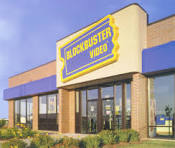Fade Out Blockbuster

I was sitting at an outdoor café a couple of nights ago and noticed a photographer taking pictures of the exterior of the video store next to where I was sitting.I quickly concluded that the photographer wanted to document the demise of the video store industry due to Blockbuster Video’s announcement that the company was closing all of its remaining locations,marking the end of the line for chain video stores.
I immediately had a “pop-up thought” of Mildred Katz, who I hadn’t thought of in 30 years.She was the official office manager and unofficial house mother for the Hap Byers Photography firm I worked at while putting myself through college. Mildred was a grandmother when I knew her,so I’m sure she has been a “blessed memory” for at least a decade already, but I have grand memories of her and her husband, Jack.
Jack was aptly named because he was a jack-of-all-trades kind of guy.He was also one of those “first adapters”who was always interested in starting new cutting-edge businesses.If he were alive today, he would be opening a medical marijuana or E-cigarette shop or some other trendy new store. When video sales and rentals came onto the market, I remember Mildred telling me that she and Jack were opening one of the first video stores; I’m not sure if it was Betamax or VHS. Back then the whole idea of a video store sounded like a harebrained scheme to me because most people hadn’t yet bought the equipment and it was still nowhere near user-friendly.
It’s decades later now and things have changed. Hap Byers Photography, its house mother/manager, and the delivery system for movies that was Blockbuster are nothing but memories. The digital revolution has put video rentals in the same category as payphones, one-hour photo finishing,and telegrams—all still exist but are no longer mainstream businesses.
I make my living owning and managing commercial properties, mostly neighborhood strip malls, generally occupied by supermarkets, drugstores, restaurants, liquor stores, and a few mom-and-pop tenants. Blockbuster was one of our and every other strip mall owner’s most important tenants.At its peak in 2004, Blockbuster had about 60,000 employees and over 9,000 stores, with an aggregate of 240 million square feet of space.
Businesses come and go, ideas come and go, people come and go.Prior to Blockbuster, most of those properties had been occupied by gas stations.At that time it seemed as if there was a gas station on every major corner,and sometimes all four corners had competing stations.After the gas-shortage crisis in the 1970s, gas stations started to consolidate, so today there are hardly any corners with four stations, and sometimes it’s even hard to find a gas station.
There’s a regular rhythm and flow to life and to business as well.
The first popular camera, made by Kodak, was introduced in 1900, and its format lasted about 100 years, until suddenly you could take a picture with a digital camera that didn’t need film—and then you didn’t even need a camera; you could take a picture with a cell phone.The printing press was invented in the Far East in the 11th century and in Europe in the 15th century.For hundreds of years people read only printed books and, eventually, newspapers and magazines, so for centuries it seemed as if the printed word on paper was the only way that we would ever read books, newspapers, and magazines. Now, up to 50 percent of novels are sold as ebooks, and newspapers and magazines all have content on the Internet while many magazines are produced exclusively online.
Most of the former Blockbuster Video locations have been filled by other tenants.Just as videos were replaced by DVDs,now both have been replaced by downloading from the Internet, and we can watch films and television shows on our computers, cell phones, and tablets. The Buddha said that the cause of human suffering is attachment to desire.To me, attachment is part of being human, especially attachment to other human beings.If we lose someone close to us, it is natural and appropriate to mourn them, miss them, and hold them in our loving memory.But what about attachment and the way it affects how we respond to other kinds of changes?
Today the rate of change in all fields is unprecedented.When we find it challenging to adapt to new things one reason may be that we are remaining attached to our desire for what came before.My personal philosophy about this is that it’s okay, sometimes even instructive, to remember what came before, but as much as possible I don’t want to be attached to it.I don’t want to hold onto wanting to bring back “the way it was”; if I do that, it will only cause me frustration and stress.
Remaining attached to what came before puts our energy into the past instead of the present.An example:If I spend energy thinking about how nice it was to have Blockbuster Videos as a tenant of so many of our properties, I’m not devoting my energy to finding new tenants in the present and to moving forward into the future.
We thrive when we live our lives with integrity and enjoy what life offers us in the moment!
- 5 Dec, 2013
- Posted by Steve Fogel
- 0 Comments



COMMENTS